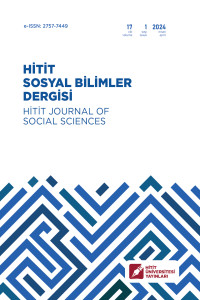Kazanç Yönetiminin Kar Dağıtım Politikaları Üzerindeki Etkisi: BİST Sınai Endeksinde Bir Uygulama
The Impact of Earnings Management on Dividend Distribution Policies: A Study on BIST Industrial Index
Author(s): Bahadır UYSAL, Evren YanyaSubject(s): Financial Markets, Human Resources in Economy, Socio-Economic Research
Published by: Hitit Üniversitesi
Keywords: Earnings Management; Dividend Policies; Accounting Manipulation; Panel Data Analysis; BIST Industrial Index;
Summary/Abstract: While trying to achieve the goal of maximizing shareholders' wealth, business managers must also manage cash flows and factors affecting risk. Dividend, which is one of the primary expectations of shareholders from the enterprise, varies depending on the dividend policy determined by the enterprise. Therefore, it is important to calculate how much profit the entity made in the relevant period. The profit reported in the income statement is a value that can be manipulated at the discretion of business managers. Profit subject to distribution consists of cash flows from operating activities and total accruals. It is assumed that cash flows from operating activities cannot be manipulated. Therefore, profit amounts can be manipulated by increasing or decreasing total accruals. This method is known in the literature as earnings management, which is an accounting manipulation. Earnings management can be defined as transactions in which profits are misstated in accordance with laws and accounting standards. Profit that can be manipulated through earnings management is distributed to shareholders within the scope of dividend policy. In this case, stakeholders who make decisions based on financial statement information are misled and their investment decisions are negatively affected. The question of whether there is a relationship between earnings management practices and dividend policy has been the subject of study in the literature. However, no generally accepted relationship between the two variables has been identified in the studies. The literature review reveals that this relationship has not been sufficiently investigated in Turkey. In this context, this study aims to examine the relationship between dividend policy and earnings management in Turkey by calculating discretionary accruals according to two different models. In the study, the data of 35 companies in the BIST Industrial Index that distribute dividends without interruption for the period 2015-2021 are analyzed with panel data analysis. Some statistical models based on accrual basis have been developed to determine earnings management. This study uses the adjusted Jones (1995) and Kothari (2005) models to measure discretionary accruals. Huber, Eicker and White Estimator was used to overcome the problem of heteroscedasticity in the model results. According to the results of Model 1, there is a negative relationship between dividend policy and discretionary accruals calculated with the Adjusted Jones model at 5% significance level. In Model 2, where this result is tested, a negative and significant relationship is found between discretionary accruals calculated with the Kothari Model and dividend policy. When the coefficients are evaluated, it is seen that both models support each other. A one unit increase in discretionary accruals decreases the dividend distribution policy by 1.139 units according to Model 1 and 1.120 units according to Model 2. No significant results were obtained for the return on equity, current ratio and leverage ratio variables used as control variables. When the findings of the study are evaluated, the importance of restrictive legislation emerges. In this context, being transparent to investors and protecting their rights may have a more restrictive impact on earnings management practices. Legal regulations that effectively protect investors reduce the need for managers to conceal business performance. Therefore, it can be stated that earnings management can be implemented in a more limited way in countries where the legal protection of investors is strong. On the other hand, when it is considered that the earnings obtained by the companies through earnings management are not sustainable, permanent and real, they should not be expected to distribute dividends. In other words, the earnings obtained by the enterprise through earnings management practices show a unreal nature. For this reason, it is thought that the enterprise will refrain from distributing a profit that it does not actually earn as dividend.
Journal: Hitit Sosyal Bilimler Dergisi
- Issue Year: 17/2024
- Issue No: Sp. Issue
- Page Range: 1-23
- Page Count: 23
- Language: Turkish

